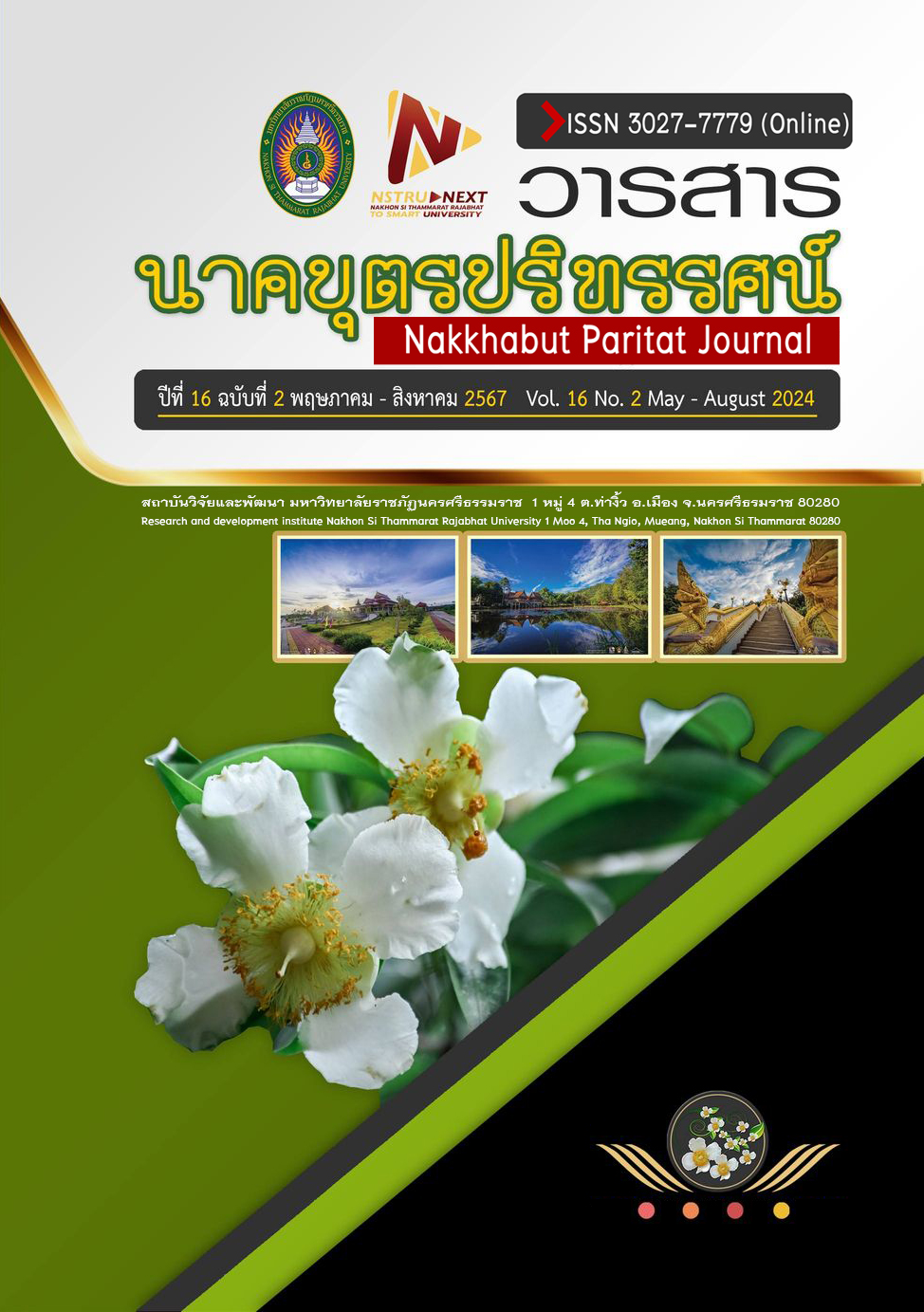การพัฒนารูปแบบการจัดการเรียนรู้สังคมศึกษาตามแนวทางศาสตร์พระราชาเพื่อวิถีชีวิตเศรษฐกิจพอเพียง สำหรับนักศึกษาระดับปริญญาตรี
Main Article Content
บทคัดย่อ
การวิจัยครั้งนี้มีวัตถุประสงค์ 1) เพื่อพัฒนารูปแบบการจัดการเรียนรู้สังคมศึกษาตามแนวทางศาสตร์พระราชาเพื่อวิถีชีวิตเศรษฐกิจพอเพียง สำหรับนักศึกษาระดับปริญญาตรี 2) เพื่อประเมินประสิทธิผลรูปแบบการจัดการเรียนรู้สังคมศึกษาตามแนวทางศาสตร์พระราชาเพื่อวิถีชีวิตเศรษฐกิจพอเพียง สำหรับนักศึกษาระดับปริญญาตรี 3) เพื่อประเมินและปรับปรุงรูปแบบการจัดการเรียนรู้สังคมศึกษาตามแนวทางศาสตร์พระราชาเพื่อวิถีชีวิตเศรษฐกิจพอเพียง สำหรับนักศึกษาระดับปริญญาตรี กลุ่มตัวอย่างที่ใช้ในการวิจัย ได้แก่ นักศึกษาปริญญาตรี มหาวิทยาลัยราชภัฏเพชรบุรี ที่ลงทะเบียนเรียนรายวิชาพลเมืองที่เข้มแข็ง ภาคเรียนที่ 2 ปีการศึกษา 2563 จำนวน 45 คน ซึ่งได้มาโดยวิธีการสุ่มอย่างง่าย เครื่องมือที่ใช้ในการวิจัย ได้แก่ คู่มือการใช้รูปแบบการจัดการเรียนรู้ แผนการจัดการเรียนรู้ แบบทดสอบความรู้ และสอบถามความพึงพอใจต่อการใช้รูปแบบการจัดการเรียนรู้ สถิติที่ใช้ในการวิเคราะห์ข้อมูล ได้แก่ ค่าเฉลี่ย ส่วนเบี่ยงเบนมาตรฐาน การทดสอบค่าที และการวิเคราะห์เนื้อหา ผลการวิจัย พบว่า
1) รูปแบบการจัดการเรียนรู้สังคมศึกษาตามแนวทางศาสตร์พระราชาเพื่อวิถีชีวิตเศรษฐกิจพอเพียง สำหรับนักศึกษาระดับปริญญาตรี มีองค์ประกอบ 4 ประการ ได้แก่ หลักการ วัตถุประสงค์ กระบวนการจัดการเรียนรู้และเงื่อนไขการนำรูปแบบการจัดการเรียนรู้ไปใช้ กระบวนการจัดการเรียนรู้ ประกอบด้วย 5 ขั้นตอน ได้แก่ (1) ขั้นที่ 1 สร้างความสนใจ (2) ขั้นที่ 2 กำหนดปัญหาร่วมกัน (3) ขั้นที่ 3 สะท้อนข้อแลกเปลี่ยน (4) ขั้นที่ 4 ประเมินผลร่วมกัน และ (5) ขั้นที่ 5 สรุปผลการเรียนรู้ 2) ผลการประเมินประสิทธิผลของรูปแบบการจัดการเรียนรู้ พบว่า (1) นักศึกษา
มีผลคะแนนการเรียนรู้รายวิชาพลเมืองที่เข้มแข็งหลังเรียนสูงกว่าก่อนเรียนอย่างมีนัยสำคัญทางสถิติที่ระดับ .05 และ (2) นักศึกษามีความพึงพอใจต่อการใช้รูปแบบการจัดการเรียนรู้โดยรวมอยู่ในระดับมากที่สุด และ 3) ผลการประเมินและปรับปรุงรูปแบบการจัดการเรียนรู้ พบว่า ผู้เชี่ยวชาญมีความคิดเห็นต่อคุณภาพของรูปแบบการจัดการเรียนรู้ โดยรวมอยู่ในระดับมากที่สุด
Article Details

อนุญาตภายใต้เงื่อนไข Creative Commons Attribution-NonCommercial-NoDerivatives 4.0 International License.
เอกสารอ้างอิง
Bandura, A. (1977). Social Learning Theory. New Jersey: Prentice –Hall.
B.Ed. Social Studies. (2019). Bachelor of Education Program Social Studies Faculty of Humanities and social sciences Phetchaburi Rajabhat University. Phetchaburi: Phetchaburi Rajabhat University (in Thai)
Creswell, J. W. & Plano Clark, V. L. (2011). Design and conducting mixed methods Research (2nd cd.). Thousand Oaks, CA: Sage.
Guglielmino, L. M. (1977). “Development of the Self-Directed Learning Readiness Scale,” Doctoral Dissertation. Athens, Georgia: University of Georgia.
Johnson, D; Johnson Roger & Johnson, Holubec. (1993). Cooperative in the Classroom. Minnesota: Interaction Book.
Kaewurai, W. (2011). A Learning Management Model Based on the Sufficiency Economy Philosophy
in Teacher Profession, University of the North. Nakhon Sawan Rajabhat University Graduate Studies Journal, 6 (17), 13-30. (in Thai)
Knowles, M.S. (1975). Self-Directed Learning: A Guide for Learners and Teachers. Chicago: Follett Publishing Company.
Namuang. (2013). Development of a learning management model for teaching philosophy.of Sufficiency Economy for primary school students. Songkhla University Journal Nakarin, 5(3), 96-109. (in Thai)
Ngourungsi, K. (2016). Education for Sustainable Development. Journal of the Association of Researchers, 21(2), 17-18. (in Thai)
Ounruen, W. (2020). An Instructional Model Development Based on Social Constructivism and Authentic Learning Approaches to Enhance Differentiated Instruction Ability for Student Teachers. Journal of Education Naresuan University, 25(1), 222-237. (in Thai)
Panakul, S. (2013). Social Studies Curriculum Development and Evaluation. Bangkok: University. (in Thai)
Powell, K. C., & Kalina, C. J. (2009). Cognitive and social constructivism: Developing tools for an effective classroom. Education, 130(2), 241-250.
Raths, M., Louis, E. (1978). Values and Teaching. Ohio: Charles E Merrill Publishing.
Rookha, T. (2022). Teacher development on Learning management base on of Sufficiency Economy Philosophy a case study of Phang-nga School for The deaf under special Education Bureau. (Independent Study Master of Education), Surat Thani Rajabhat University, Graduate School. (in Thai)
Somabutra, A. (2018). Learning Skills and Innovation for Learning in the 21st century. Educational Technology, Faculty of Education. Teaching documents. Khon Kaen:Khon Kaen University. (in Thai)
Sinlarat, P. (2011). Principles and techniques of teaching at the higher education level. Bangkok: Dhurakij Pundit University. (in Thai)
Slavin, E. (1994). Educational Psychology. 4th ed. New York: Allyn and Bacon.
Srisa-an, W. (1999). Guidelines for reforming the educational administration system in the Ministry of Education. Educational reform journal, 1(12), 7-16. (in Thai)
Tansiri, W. (1993). Learning networks and lifelong education. National education, 27(4), 5-12. (in Thai)
Tough, A. (1971). The Adult’s Learning Projects. Toronto: The Ontario Institute for Studies in Education.
Tungkasamit, A. (2011). The development of an Sufficiency Economy Philosophy instruction process. Veridian E-Journal, SU, 4(2), 288-301. (in Thai)
Wongyai, W. (2011). Innovative Curriculum and Learning for Good Citizenship. Bangkok: R & Print Company Limited. (in Thai)


